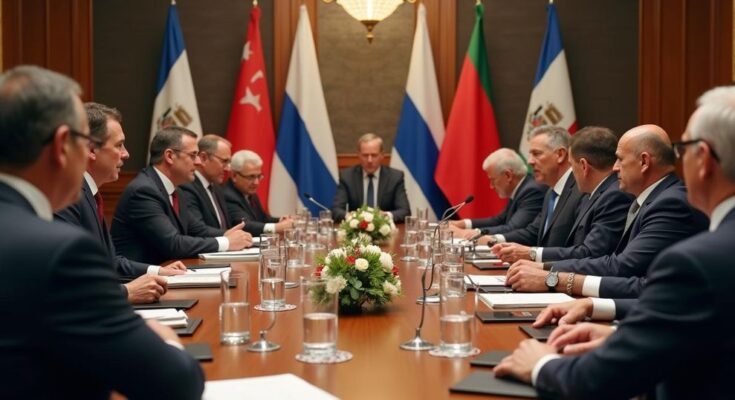Former President Trump has indicated that if elected, he will aim to renegotiate international trade agreements, criticizing past deals as unfavorable to the United States. He proposes significant tariffs on Chinese imports and emphasizes the need for improved terms, particularly concerning the automotive industry and key international partners.
In a recent interview on “Sunday Morning Futures,” former President Donald Trump outlined his plans for international trade if he secures victory in the upcoming presidential election. He articulated his belief that the United States has been unfairly treated in trade relations with key global partners including Mexico, China, Canada, and the European Union, stating, “We’ve been screwed by Mexico and by China and by Canada and by the European Union.” Trump emphasized his intention to renegotiate trade agreements, specifically the U.S.-Mexico-Canada Agreement (USMCA), using clauses that would allow him to make amendments and improvements, which he credits to his background as a businessperson. Trump’s approach includes imposing a significant 200% tariff on all Chinese automobile imports from Mexico, a measure he believes would render them commercially unviable in the U.S. market. This is particularly pertinent given Mexico’s status as the largest export market for U.S. automotive parts and its increasing share in that market, rising from 38% in 2017 to 42.5% in 2023, according to the International Trade Administration. In discussing trade agreements, Trump criticized the legacy of the North American Free Trade Agreement (NAFTA), which he described as having numerous errors and detrimental implications, asserting that it was the worst deal. He also pointed to his successes while in office, referencing favorable trade deals made with Japan and South Korea, and his strategies regarding Iran and China, aimed at leveraging U.S. power in international trade negotiations.
The issue of international trade has been a critical topic in American politics, particularly concerning the renegotiation of trade agreements. Key agreements such as NAFTA, which was replaced by the USMCA, have significant impacts on industries such as automotive, where trade dynamics with countries like Mexico and China are particularly influential. Trump’s position on trade, focusing on tariffs and renegotiation, resonates with a significant voter base concerned about job security and economic sovereignty. Understanding the trends in automotive parts imports and the broader implications of trade agreements is essential to grasping the context of Trump’s assertions and proposed policies.
In summary, Donald Trump’s trade agenda reflects his assertive approach toward international negotiations, emphasizing the need for the United States to obtain favorable terms in its trade relationships. His critique of existing agreements and proposal for renegotiation illustrate a commitment to prioritizing American economic interests and enhancing the resilience of domestic industries, particularly in the automotive sector. As Trump continues to campaign for the presidency, these trade policies will likely serve as a cornerstone of his platform.
Original Source: www.foxnews.com




